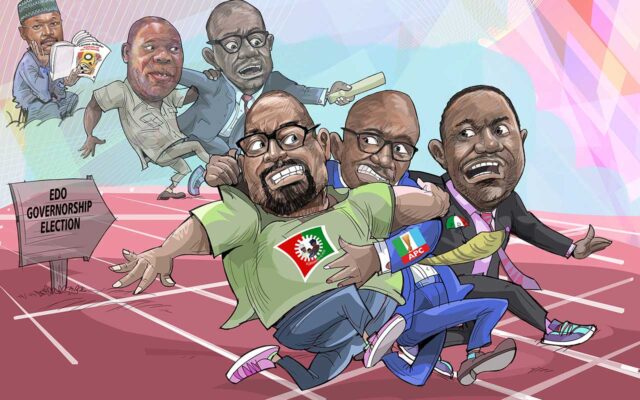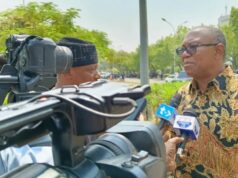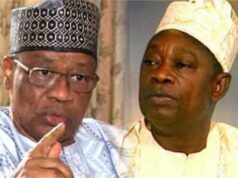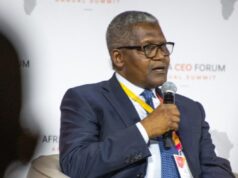Tomorrow, residents of Edo State will file out to elect a new governor. With more than a dozen contenders on the ballot, the stakes could not be higher, especially with cries of infrastructural decay, unemployment, untapped potential, and dismal education sector renting the air. While the Peoples Democratic Party struggles to ward off opposition parties and maintain its grip on the state, opposition parties are girding their loins for a showdown. But the race to Osadebe Avenue is made more interesting with three former allies turned rivals – Adams Oshiomhole, Godwin Obaseki, and Asue Ighodalo – playing key roles in the contest. With the quest for good governance, electorates in the state have a choice to make. MUYIWA ADEYEMI, SEYE OLUMIDE, LAWRENCE NJOKU, KEHINDE OLATUNJI and MONDAY OSAYANDE report.
Nigeria’s political milieu is replete with scenarios in which friends, business associates, political acquaintances, and sundry characters coalesce their interests and form alliances to actualise their political goals at local, sub-national, and national levels.
For instance, the triumvir formed by Donald Etim Duke, Liyel Samuel Imoke, and Gershom Henry Bassey in Cross River State after military rule in 1998 falls into this category.
That troika formed by these men, who were in their 30s then successfully altered the then-existing political order to the utter amazement of the old political establishment and went ahead to midwife a process that saw Duke emerge as governor.
He was succeeded by Imoke after serving two terms. Imoke, the youngest senator in Nigeria between 1992 and 1993 also did two terms as governor. Bassey, a multi-millionaire businessman was on the cusp of also realising his ambition of becoming the state governor, but prevailing political realities at that time did not allow the pendulum to swing his way.
That notwithstanding, he has served two terms as senator representing Cross River South senatorial district in the National Assembly.
That said, the accomplishment of the trio, who were sometimes jocularly referred to as the “Three Musketeers” would never have been possible without the political sophistication, sagacity, machismo, shrewdness, and agility that they displayed; the vision that they bore, the national connections that they established, the political clout that they leveraged heavily, as well as their Machiavellian disposition.
Working as a tight unit, they succeeded in consigning to the trashcan, the concept of godfatherism and its importance in attaining political power.
While the last of the Three Musketeers in Cross River State could not taste executive powers, the situation in Edo State (which goes to the poll tomorrow) would have ended up as a similar scenario if not for the fact that two of the three men that used to be in a close-knit political group are now rivals ripping each other apart as they attempt to see who retains political power in the state for the next four years.
Interestingly, while Senator Adams Oshomhole is attempting to market Senator Monday Okpebholo to the state as a good replacement for Obaseki, the incumbent is holding the hands of Asue Igholdalo, who has been a key player in the state’s technocratic think tank and for years, provided brain power for Governor Adams Oshiomhole’s administration, and also served as key behind-the-scene personnel in the outgoing Obaseki-led administration.
Oshiomhole, Obaseki, Ighodalo in Anthills of the Savannah
FEW stories are as compelling as the intertwined trajectories of former governor Oshiomhole, his successor, Obaseki, and Ighodalo. Once united by the same political philosophy, and how to develop Edo State, these three political leaders whose actions or inaction will determine the outcome of tomorrow’s governorship election in the state, have experienced a dramatic evolution from allies to rivals.
Indeed, their relationship bears striking similarities to the key dramatis personae in Chinua Achebe’s classic novel, “Anthills of the Savannah,” which delves into the complexities of power, loyalty, and betrayal.
In Anthills of the Savanah,” the characters of Sam, Chris, and Ikem begin as close allies, sharing the same vision for their country. Similarly, Oshiomhole, Obaseki, and Ighodalo began their political journey with a common goal for Edo State.
Oshiomhole much like Sam was the charismatic leader who rallied support for and initiated significant changes. Obaseki, akin to Chris, was a technocrat whose expertise was crucial to implementing policies while Ighodalo, paralleling Ikem, was the intellectual and strategist who provided technical support.
Their political journey underscores the complexities and shifting alliances that characterise politics in the country, while their story is a testament to how personal ambitions and political manoeuvering transform friendships into rivalries, and its impact on politics and governance.
When Oshiomhole became governor in 2008, he found a reliable ally in Obaseki, a technocrat with a strong background in investment banking. Known for his acumen and strategic thinking, Ighodalo, a successful lawyer was also a key figure in the administration.

Back then, Oshiomhole often referred to Obaseki as the “brain and creativity” behind his administration. Until campaigns for this election began, he always told people that the relationship between him and Obaseki transcends politics because they are brothers. The outgoing governor also named the Labour House recently commissioned after Oshiomhole.
As a member of his kitchen cabinet, Oshiomhole did not have issues endorsing Obaseki to succeed him and did everything for him to win the election in 2016. But as Obaseki settled down for governance, differences in administration style and priorities began to set in. Obaseki’s approach to governance, which emphasised technocratic efficiency was a departure from traditional political patronage. It clashed with Oshiomhole’s populist style.
As in Achebe’s novel, when the once united friends begin to drift apart due to different ideologies and approaches to governance, the alliance between Oshiomhole, Obaseki, and Ighodalo is fractured. Obaseki’s approach to governance appeared to be at variance with Oshiomhole’s style, and this divergence mirrors the ideological rift between Sam and Chris in the novel leading to conflict.
Ighodalo, like Ikem, had maintained a low profile but found himself caught in the web of crossfire. His attempts to mediate between Oshiomhole and Obaseki were largely unsuccessful, and he eventually pitched his tent with Obaseki.
The rift between Oshiomhole and Obaseki got to a head in 2019 when Obaseki was disqualified from the APC primaries, a move widely believed to have been orchestrated by Oshiomhole, who was then the national chairman of the party. Obaseki decamped to the PDP and won his re-election as governor in 2020.
To retaliate for what Oshiomhole did to him, Obaseki was fingered as the brain behind the suspension of Oshiomhole at his ward, which eventually led to his removal as the national chairman of the party.
But if Ighodalo wins tomorrow’s election, it will complete the cycle of the three frenemies governing the state at different times, repeating the history of how senators Gbenga Daniel, Ibikunle Amosun, and Prince Dapo Abiodun, took their turns to govern Ogun State.
The golden era of Edo State
EDO State was created from the former Bendel State, on August 27, 1991. Its golden era was characterised by a concerted effort to build a strong foundation for future growth and development. The legacy of this period has continued to influence the state’s trajectory, shaping its identity and aspirations.
With its fertile land, it became a hub of agricultural activities. The government promoted farming, which led to increased production of crops like rubber, oil palm, and cocoa. Efforts were made to attract industries to the state, leveraging its strategic location and resources. The period saw the establishment of several manufacturing and processing plants.
Edo State, which has a lot of cultural and historical sites is home to the Oba of Benin. Some of its finest include the late Dele Giwa, Chief Gabriel Igbinedion, the late Victor Uwaifo, the late Prof. Grace Alele Williams, Albert Lagogie, the late Bishop Benson Idahosa, Prince Tony Momoh, African footballer of the year, Victor Osimhen among several others.
At its creation in 1991, the people of Edo State looked up to a great state following the contributions of their sons such as the late Ambrose Alli to the development of the old Bendel State.
Chief John Oyegun, a former national chairman of APC became the first civilian governor of the state in January 1992. His tenure was, however, short-lived as the military struck, thereby disrupting the programme of his administration.
The state from 1993 remained in the hands of military administrators until 1999 when the former military leader, Gen Abdulsalam Abubakar (rtd), returned governance to civilians.
How realising the Edo dream became a tall order
DESPITE the founding fathers’ dreams to develop a state where its human and material resources would be harnessed for the advantage of the people, the state is yet to realise its potential 33 years after. Edo is ranked among the states with the highest rate of human trafficking and prostitution.
Reports by the National Bureau of Statistics (NBS) in October 2023 indicated that the state has 1.4 million people living in multi-dimensional poverty, a figure representing 35.4 per cent of its estimated 3.9 million. The figure might have increased by now with inflation rising over 35.5 per cent and other economic crises making lives difficult for average Nigerians.
Things began to go south in the state with the return of democracy in 1999 when Chief Lucky Igbinedion became the governor and held office until 2007.
Although opinions are divided about his achievements, many believe that his administration performed poorly. His ordeals, and revelations from anti-graft agencies, and the plea bargain that set him off the hook remain a reference point on profligacy in government. Indeed, people were denied the dividends of democracy during his eight years in government.
Igbinedion was succeeded by Prof. Osunbor, who governed the state for a year (between 2007 and 2008). However, his short tenure was characterised by post-election crises and litigations.
Osunbor was removed by the Electoral Tribunal, which declared his election invalid and asked INEC to withdraw his certificate and declare Oshiomhole of then Action Congress (AC) as the winner.

Oshiomhole served from 2008 to 2016. His tenure was considered better than Igbinedion’s, but far from being an ideal government for a state sitting atop untapped agricultural resources. A referendum on Obaseki’s tenure will be part of the major factors that will decide the outcome of the election tomorrow.
Analysts believe that the Edo people were sharply divided during the bitter quarrel that followed the removal of Osunbor, a development that has remained a sour point in the politics of the state, as many still think that he was a victim of the power play.
Osunbor attempted to return to the government when he picked the Expression of Interest/Nomination form of the APC for Saturday’s election. He, however, shelved his ambition before the primary election based on advice from his supporters that age was no longer on his side.
Some are convinced that Edo State is yet to benefit from the return of democracy, nor fully utilise the opportunity offered by its creation in 1991 because of the bitter politics played by some of its leaders, which is affecting growth and development.
A political activist, Marcus Igueh, told The Guardian that part of the challenges besetting the state is its belief in culture and tradition, stressing that “even in these modern times, my people’s way of dressing and behaviours have not changed.”
He added: “There are still things that are forbidden here no matter the position of the law or what is being practiced in any other parts of the country. Aside from this, however, our people now see politics as a do-or-die thing. The fight that started in Osunbor’s era has not left Edo State, and those who began that fight are not prepared to release the person. That is why the election on Saturday will produce a winner who may not advance the course of the state.”
Expectations from new government soaring high
AS Edo goes into another round of the election, one of the cardinal concerns expressed by stakeholders is who among the candidates can be trusted to transform the state within the next four years.
Over the years, Edo State has been laid back in terms of development and progress, and it requires a turnaround across its various sectors, principally in infrastructural development.
The parlous state of its road network, which has impinged seriously on the movement of people, goods, and services, is yearning for attention.
A recent report placed the state as number two among the states with the poorest road network in Nigeria. The outgoing governor confirmed this last year when he blamed the Federal Government for neglecting all federal roads in his state.
The state is also not doing great in the provision of energy infrastructure to support economic growth. That prompted the candidate of the LP, Olumide Akpata to, on many occasions, deplore the poor state of education and skills development in the state over the years.
There is no doubt that the electorate will want to focus on such candidates, who would focus on vocational training, and skills development programs to build a competitive workforce.
Another critical area of challenges confronting Edo is environmental sustainability, which needs to be tailored to address environmental challenges like deforestation, erosion, and pollution in Edo.
The electorate will also consider the track record of candidates and their capacities to fight and reduce crime to the nearest minimum before casting their votes tomorrow.
Who wears the crown?
SINCE INEC declared campaigns open for the off-cycle election a few months ago, the stakes of the three leading candidates, Ighodalo of the ruling PDP, Akpata of LP, and Okpebholo of APC have increased daily.
Even though all of them have what it takes to win the election, several factors may swing the election in favour of Ighodalo. These include his pedigree and sound education. A lawyer, economist, and chieftain of various blue-chip companies, his eloquence and ability to sell his manifesto, “Pathway to Prosperity For All”, stands him out of the crowd.
Again, many Edo people in the Diaspora have thrown their weight behind him, the same way the National Association of Nigerian Students (NANS), Edo Professionals, and traders have done.
Also, his native Esan people have resolved to stand on their own. To them, Okpebholo’s Edo Central Senatorial District took the senate position and, therefore, should not lay claim to the governorship. They hold the view that the Ighodalo axis should take the governorship for there to be a balance of power.
Another factor that is in favour of Ighodalo is the choice of his running mate, Osarodion Ogie, who appears to command staggering followership across the three senatorial districts of the state with friends across party lines.
However, two issues stand stoutly against his aspiration. One is the much-touted federal might, which though has been dismissed repeatedly, but may be relied on by the opposition party. The other factor is the political disposition of his leader and benefactor, Obaseki, which many consider undesirable.
Ighodalo’s association with Obaseki may constitute a minus for him. This is why some have likened his candidacy to a continuation of Obaseki’s administration. For these people, stopping Ighodalo is akin to stopping Obaseki, irrespective of the development that the Obaseki administration has brought to the state, and the bold vision articulated by Ighodalo in his manifesto.
A former president of the Nigerian Bar Association (NBA), Akpata is well-read and a good choice for his party. He parades a robust manifesto, titled, “My Pact With Edo People.”
Coming from a zone that has the highest number of registered voters (up to 58 per cent, more than the other two districts put together), Akpata may ride on the popularity of his party and its performance in the 2023 general election, which enabled it to snatch a senatorial seat from PDP and APC.
But Akpata’s major disadvantage may be the consensus reached by most of the Edo elite to yield power to the central zone, which has not tasted the governorship since 1999, except for Osunbor, who governed for 18 months before the courts nullified his mandate in favour of Oshiomhole in 2008.
Unlike the PDP and the APC, which have known political figures as running mates, the LP deputy governorship candidate, Alhaji Yusuf Asamah Kadiri SAN, is largely unknown in the political landscape of the state. It is doubtful if he can muster votes for the LP ticket.
The APC candidate, Okpebholo, is not a political neophyte, he leverages some political experience, especially as a senator, and he also has the backing of the ruling party at the centre with its federal might.
Okpebholo equally has to his advantage, good campaign managers, who do the talking for him and have boasted about how they would explore federal might to his advantage.
Despite those advantages, Okpebholo appears to lack the depth and the gravitas to run a state today. Talk about articulation, eloquence, grasp, and knowledge of issues, he is in a different realm.
It is no wonder that he avoids debates like plagues – either in the print or electronic media. Coming from the same senatorial district as the PDP candidate is another disadvantage because both will split votes from the Edo Central Senatorial District.
PDP, APC, LP tango over election
THE three major parties and their supporters are exuding confidence in winning the election.
Boasting that nothing will stop APC from occupying Osedabe Avenue, campaign spokesperson of the party, Kassim Afegbua, said: “The deeds have been done. PDP must quit the seat of power in Edo. We are winning this election, despite threats by Governor Obaseki. We have spoken so loudly to the Edo people, and they are resolved to chase out Obaseki and the vestiges of a wasteful government that has underperformed in the last eight years.
“We are resolved to bring back our state and unite the people because Obaseki has divided us in such a way that affected our homogeneity. He has undermined the traditional institutions and the local councils.”
And, going by the eight years that Obaseki has been in office, he’s been at loggerheads with almost everyone, including the monarchy, which has generated unnecessary tension across the land.
Tomorrow’s election will be a referendum of some sort “to finally put the nail of rejection on Governor Obaseki,” Afegbua said.
Labour Party supporters, which people refer to as the “Obidients” are growing wings in the political arena, fighting hard to push others aside and chest the tape.
Akpata and his supporters are not taking anything for granted and are working assiduously to convince the electorate to vote for their party.
The Edo State chairman of the party, Elizabeth Uyimwen Aitivie, said: “We have prepared to win this election. We are ready to change the narrative.”
Aitivie, a former Speaker of Edo State House of Assembly, told The Guardian that while “two elephants (PDP and APC) are fighting, we will quietly and quickly pick the ticket and go straight to sweep everything Obaseki away from the Government House and occupy it for the next four years and beyond.”
She noted that LP would manoeuvre its way via electoral rules to coast to victory “because not only have we prepared to win the election, but we are also ready to change the narrative.”
For the PDP, there is no other party in Edo State that competes with it.
The state Commissioner for Local Government and Chieftaincy Affairs, Monday Osaigbovo, said: “Edo State is PDP, and Obaseki for the past eight years has changed a lot of things like infrastructure, agriculture, and human capital development. And for this and many more things that he has done for the state, the coast is clear for the PDP to win. We are waiting for Saturday for the people to cast their votes, which will be in our favour.”
Osaigbovo predicted that PDP would win 80 per cent of votes cast, insisting that APC and LP are not a threat to Ighodalo emerging as governor of the state.
Speaking on the effect of godfathers, which is negatively affecting democracy in the state, but is very hard to let go of, Afegbua said: “There is nothing like godfathers in APC. But everyone desires to deliver Edo State from its present morass and disconnections, re-launch it to national reckoning, and inject new thinking into the state.”
He highlighted some of the wrongdoings of Obaseki, which must be addressed saying: “Obaseki incurred so much debt. Imagine N570 billion in domestic debts and $143 million in external debts on only God-knows projects. The state is rotten, but we will try our best to ensure that we clean up the system and run a people-friendly governance structure when we come on board. We will be busy from Day One, and our emphasis will be to ensure that the people are carried along. A transparent government that is open to all is very necessary at this time. Edo State needs a surgical operation and we will do just that to birth a governance structure that would be productive.”
But Osaigbovo said that opposition parties are bereft of what Governor Obaseki has done in eight years. While reeling out Obaseki’s achievements, the commissioner said that about 14,000 hectares of government land in Okomu, Ovia South West, left unutilised for years was brought to life, and as we speak is producing oil, ethanol, flowers, and others.”







